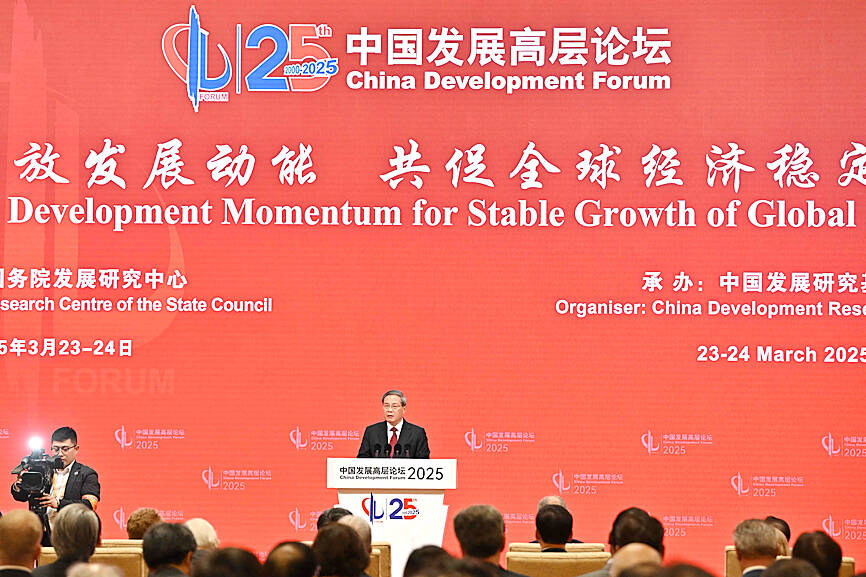Chinese Premier Li Qiang (李強) said the country is prepared for “shocks that exceed expectations” as the world braces for US President Donald Trump to announce more tariffs on its trading partners next month.
Countries should open up markets in the face of growing economic fragmentation, Li yesterday told a gathering of global business leaders and visiting US Senator Steve Daines at the start of the China Development Forum in Beijing.
“Instability and uncertainty are on the upswing,” Li said. “At this time, I think it is even more important for each of our countries to open up markets more, and for all of our businesses to share their resources more.”

Photo: AFP
Top executives including Apple Inc’s Tim Cook, Qualcomm Inc’s Cristiano Amon, Pfizer Inc’s Albert Bourla and Saudi Aramco’s Amin Nasser are attending the two-day conference. Bloomberg News earlier reported that plans were being made for corporate titans to meet Chinese President Xi Jinping (習近平) on Friday.
Daines, a member of the US Senate Foreign Relations Committee, on Saturday met with Chinese Vice Premier He Lifeng (何立峰), a rare public exchange between US and Chinese officials since Trump returned to the White House. The US senator also met Li yesterday.
The Chinese premier reiterated a central bank pledge that policymakers would cut interest rates and the reserve requirement ratio when “timely,” and vowed to offer more support when necessary to ensure the economy runs smoothly.
Li’s remarks come as China renews efforts to attract foreign businesses after inbound investment tumbled last year to its lowest in over three decades.
“We are beginning to see some re-engagement with international investors coming into China,” Standard Chartered PLC chief executive officer Bill Winters said on the sidelines of the forum. “The only thing slowing down a little bit is the consumer credit business in China, because we know the economy is a little sluggish, so that stream of activities has not been growing as fast.”
The China Development Forum started in 2000, serving as a platform for high-level dialogue between China and the world.
Most years, the keynote speech was delivered by a vice premier, and the premier would hold a closed-door meeting with executives. In a break with precedence, Li addressed the forum last year while Xi met with a number of US business chiefs after the event, as Beijing sought to counter the downbeat narrative on its economy.

TAKING STOCK: A Taiwanese cookware firm in Vietnam urged customers to assess inventory or place orders early so shipments can reach the US while tariffs are paused Taiwanese businesses in Vietnam are exploring alternatives after the White House imposed a 46 percent import duty on Vietnamese goods, following US President Donald Trump’s announcement of “reciprocal” tariffs on the US’ trading partners. Lo Shih-liang (羅世良), chairman of Brico Industry Co (裕茂工業), a Taiwanese company that manufactures cast iron cookware and stove components in Vietnam, said that more than 40 percent of his business was tied to the US market, describing the constant US policy shifts as an emotional roller coaster. “I work during the day and stay up all night watching the news. I’ve been following US news until 3am

UNCERTAINTY: Innolux activated a stringent supply chain management mechanism, as it did during the COVID-19 pandemic, to ensure optimal inventory levels for customers Flat-panel display makers AUO Corp (友達) and Innolux Corp (群創) yesterday said that about 12 to 20 percent of their display business is at risk of potential US tariffs and that they would relocate production or shipment destinations to mitigate the levies’ effects. US tariffs would have a direct impact of US$200 million on AUO’s revenue, company chairman Paul Peng (彭雙浪) told reporters on the sidelines of the Touch Taiwan trade show in Taipei yesterday. That would make up about 12 percent of the company’s overall revenue. To cope with the tariff uncertainty, AUO plans to allocate its production to manufacturing facilities in

COLLABORATION: Given Taiwan’s key position in global supply chains, the US firm is discussing strategies with local partners and clients to deal with global uncertainties Advanced Micro Devices Inc (AMD) yesterday said it is meeting with local ecosystem partners, including Taiwan Semiconductor Manufacturing Co (TSMC, 台積電), to discuss strategies, including long-term manufacturing, to navigate uncertainties such as US tariffs, as Taiwan occupies an important position in global supply chains. AMD chief executive officer Lisa Su (蘇姿丰) told reporters that Taiwan is an important part of the chip designer’s ecosystem and she is discussing with partners and customers in Taiwan to forge strong collaborations on different areas during this critical period. AMD has just become the first artificial-intelligence (AI) server chip customer of TSMC to utilize its advanced

Six years ago, LVMH’s billionaire CEO Bernard Arnault and US President Donald Trump cut the blue ribbon on a factory in rural Texas that would make designer handbags for Louis Vuitton, one of the world’s best-known luxury brands. However, since the high-profile opening, the factory has faced a host of problems limiting production, 11 former Louis Vuitton employees said. The site has consistently ranked among the worst-performing for Louis Vuitton globally, “significantly” underperforming other facilities, said three former Louis Vuitton workers and a senior industry source, who cited internal rankings shared with staff. The plant’s problems — which have not